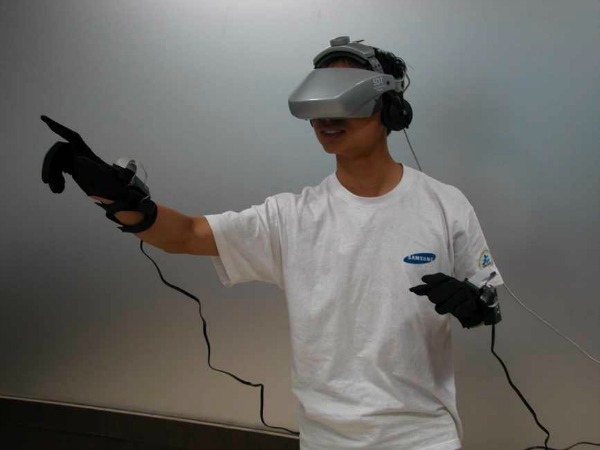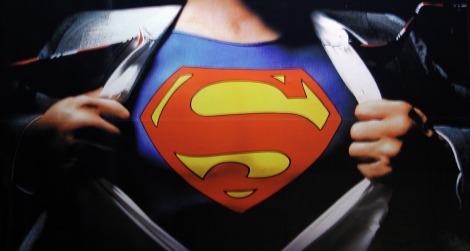Virtual Superhuman Powers Translate into Real Life Helpfulness
Thinking like a superhero in virtual reality may induce people to be more helpful in real life

A subject uses a helmet and gloves in the real world to enter a virtual world. Photo via Flickr user caseorganic
Action-centric video games have gotten a bad rap for their often violent content. Previous research says the brutal material can leak into real-world behavior, producing more aggression and triggering physiological changes in children’s brains. But what about virtual reality situations that put players in rescue-mode without the gore and pillaging?
What happens in these types of fantasy worlds also translates into real-life behavior, but in a different way: People who are given superpowers meant to save someone in virtual reality are more helpful outside of it.
This finding, reached Robin Rosenberg and colleagues from Stanford University’s Virtual Human Interaction Lab and published yesterday in a PLOS ONE study, relies on the illusion that what happens in virtual reality is real. Participants viewed the world through a head-mounted display, a helmet that provides three-dimensional stereoscopic views of a high-resolution rendered environment. An orientation sensor on the helmet tracked participants’ physical head movements and updated their rendered first-person perspective. To enhance the seeming reality of the the experience, virtual sound was added to match the movement of objects and the vibration associated with action.
In the study, each participant was placed separately in a virtual environment and either given the power of flight, a la Superman, or was a passenger in a helicopter. They were then assigned to one of two tasks. The first involved searching through a virtual city for a young, lost diabetic child in need of life-saving insulin, which they were told they held in a vial in their pocket. After three minutes of searching either via human flight or by helicopter, the child appeared, and an end sequence commenced showing its life had been saved. The second involved touring the virtual city, which was designed to be foggy and devoid of cars and people. The city in both circumstances had been evacuated due to an earthquake, participants were told.
After the virtual experience, the experimenter assisting participants “accidentally” knocked over a cup of pens, allowing the participants the opportunity to help pick them up. The researchers found that regardless of the task, those who used superpowers to fly through the fantasy world were quicker to help pick up the pens compared to those who rode in the virtual helicopter. These participants also picked up more pens than their helicopter-riding counterparts. Six participants out of 60 (30 males and 30 females) didn’t help at all–all six had cruised through the fantasy world in a helicopter.

Credit: Flickr user Xurble
How can a simulation trigger such prosocial behavior? The researchers suggest that embodying a superhuman quality in virtual reality primes people to think like superheros, such as Superman. Researchers made no mention of the word “superhero” or the prefix “super” at any point during the experiment. But by simply possessing a superhuman ability, participants seemed to tap into what they know about the characters that have them—that they use their power for the greater good rather than personal gain. Researchers believe cognitive channels linking “super” activity and its related stereotypes to heroism and helping behavior may have opened up, influencing participants’ decision to help.
And it doesn’t seem difficult for people to internalize what they see happening to their avatars (their computer-rendered, 3D selves) in virtual reality. For instance, people walking on top of a virtual log to cross a rendered chasm exhibit increased levels of stress measured by skin conductance. They know they’re not actually balancing atop a pit, about to fall, yet they experience multiple psychological symptoms associated with that fear.
Virtual reality’s penchant for inducing behavioral changes has been studied before, and the resulting good behavior moves beyond just picking up pens. A 2011 study found participants in a weight-loss program involving traditional gym sessions lost similar amounts of weight and body fat as those whose workouts were delivered online in a 3D virtual world.
In another study published in 2011, also conducted by the Virtual Human Interaction Lab at Stanford University, researchers found that virtual behavior affected people’s feelings about helping the environment. Participants were forced to saw down virtual trees using a joystick called a haptic device, which vibrated in their hands to simulate the real feeling of cutting through wood. Following the task, participants believed more strongly that they could personally improve environmental conditions than those who simply read a detailed description of deforestation. They also used less paper when cleaning up an “accidental” water spill in the physical world.
Researchers in the recent study suggest there may be more to the resulting prosocial effects than just priming effects. Pretending to possess a superpower may shift a person’s self-concept so he or she sees himself or herself as “someone who helps,” an identify change that could have lasting effects on behavior.
/https://tf-cmsv2-smithsonianmag-media.s3.amazonaws.com/accounts/headshot/marina-koren-240.jpg)
/https://tf-cmsv2-smithsonianmag-media.s3.amazonaws.com/accounts/headshot/marina-koren-240.jpg)